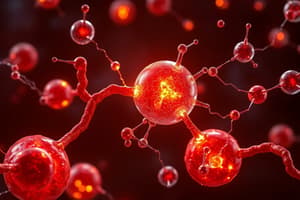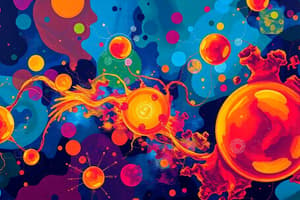Podcast
Questions and Answers
What is the main purpose of cellular metabolism in living organisms?
What is the main purpose of cellular metabolism in living organisms?
To maintain life by providing energy for growth, reproduction, and responding to environmental changes.
Explain the difference between anabolism and catabolism in metabolic reactions.
Explain the difference between anabolism and catabolism in metabolic reactions.
Anabolism involves building larger molecules from smaller ones, requiring energy, while catabolism breaks down larger molecules into smaller ones, releasing energy.
What is the role of ATP in cellular metabolism?
What is the role of ATP in cellular metabolism?
ATP is the energy currency of living cells, converting the energy liberated from the oxidation of organic fuels into a usable form for cellular functions.
How many kilocalories are produced on oxidation of each gram of carbohydrate, protein, and fat?
How many kilocalories are produced on oxidation of each gram of carbohydrate, protein, and fat?
What is the biomedical importance of biological oxidation?
What is the biomedical importance of biological oxidation?
What are the two types of cellular respiration?
What are the two types of cellular respiration?
Do catabolic pathways produce ATP?
Do catabolic pathways produce ATP?
What are the major catabolic pathways for the production of ATP?
What are the major catabolic pathways for the production of ATP?
What are the stages of cellular respiration and where do they occur?
What are the stages of cellular respiration and where do they occur?
What are the three principal components of the diet that undergo biological oxidation in the human body?
What are the three principal components of the diet that undergo biological oxidation in the human body?
Flashcards are hidden until you start studying




